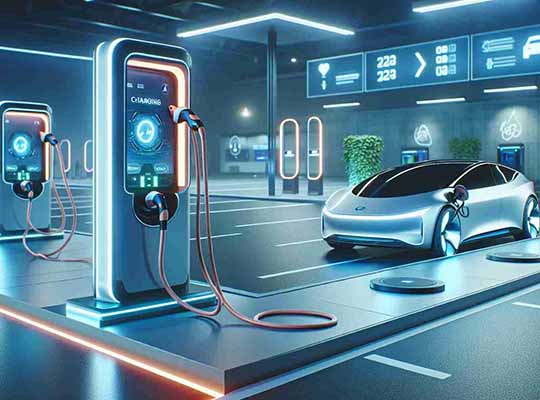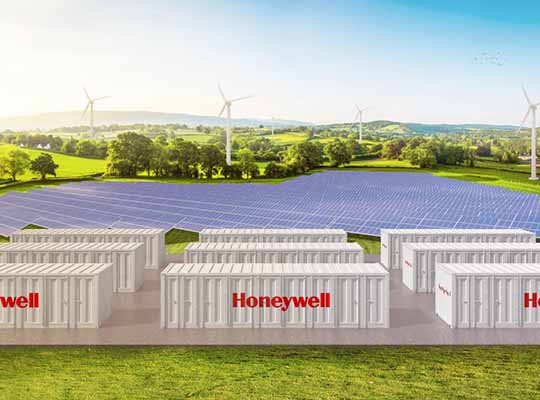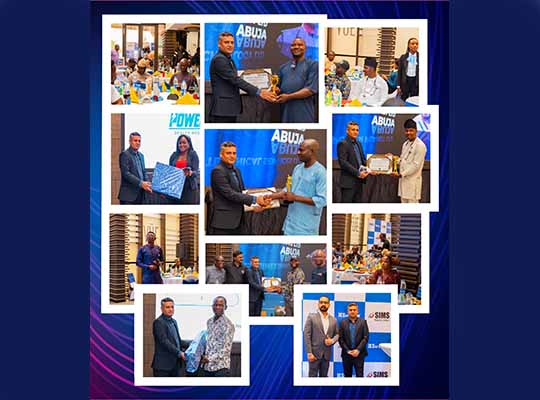RS a global provider of product and service solutions for industrial customers, offers an extensive portfolio of electrical and electronic component and device solutions engineered to satisfy the unique demands of EV charging infrastructure and encourage increased commercial and consumer adoption.
Despite a recent slew of negative headlines, EVs are steadily claiming a larger share of the consumer market as falling prices combine with financial and environmental benefits, and commercial fleet operators are starting to follow suit. Gas-powered medium- and heavy-duty (MD/HD) commercial vehicles, like transit buses and delivery trucks, have a significantly higher environmental impact than light-duty commercial vehicles and passenger vehicles — accounting for 26% of national fuel consumption despite making up just 4% of the total vehicle population. So, transitioning them to electric power is a high priority in terms of reducing greenhouse gas emissions, combating climate change, and even creating healthier communities since tailpipe pollution is linked to asthma, lung cancer, and heart disease.
Switching commercial fleets from gas-powered to electric technology also has significant cost benefits over the life of the vehicles, which makes EVs even more attractive for fleet owners and operators. AAA estimates that it costs more than twice as much to fuel a gas-powered vehicle, but the savings that EVs offer extend far beyond fuel costs. EVs have a simpler design and fewer moving parts than vehicles with internal combustion engines. For example, they don’t have transmissions, spark plugs, or fuel pumps, and they never require oil changes or air filter replacements. So, switching MD/HD commercial fleets to EVs can save operators approximately $950 in annual maintenance costs per vehicle.
Plus, since many of the vehicles in MD/HD commercial fleets travel predicable routes at predictable times and roughly 90% of them travel less than 250 miles per job, it’s relatively easy for fleet operators to identify which type of battery and charging infrastructure they need and to schedule recharging during planned downtime.
So, why aren’t more commercial fleets already making the switch? The primary obstacle to switching MD/HD commercial fleets to EVs is the same one preventing EVs from reaching critical mass in the passenger vehicle market: an insufficient patchwork network of commercial EV charging infrastructure. Thankfully, U.S. government investments and initiatives, including a commitment to 100% zero-emissions MD/HD truck sales by 2040, combined with innovation throughout the supply chain, ranging from component and device manufacturers to EV charging station OEMs, is establishing the foundation for a robust, nationwide network of fast, efficient, and cost-effective commercial EV charging infrastructure.
EV charging infrastructure is only as good as the technology it’s based on — all the way down to the component and device level — and the RS portfolio of alternative energy solutions includes an extensive range of electrical and electronic products essential to the continued evolution of commercial EV charging infrastructure, including contactors, industrial transformers, DC power modules, EV charging control boards, EV charging station test adapters, and HMIs from many of the industry’s most trusted suppliers.
Contactors are essential for switching circuits on and off in high-current, high-voltage applications like battery charging power management systems. Sensata Gigavac Clean Energy GX Series contactors, which are engineered to switch loads up to 800VDC, are especially well-suited for EV infrastructure, offering high reliability, durability, and mounting versatility, as well as rugged resistance to a range of extreme environmental conditions, including submersion and operating temperatures extending from -55°C to +85°C.
Industrial transformers are used to minimize power losses, safely increase or decrease voltages prior to distribution, and provide isolation between two parts of a circuit, and in EV charging infrastructure, they’re essential for monitoring and controlling the voltage flowing from the power source to the battery and enabling the simultaneous charging of multiple vehicles. Hammond Power Solutions Sentinel Series industrial transformers are especially well-suited for use in this market because they’re engineered for energy efficiency, designed to help combat climate change, and compliant with the latest energy standards set by the Department of Energy, which reduces the total cost of ownership over the product lifetime compared to competing solutions. They’re also suitable for both indoor and outdoor applications and provide high-reliability protection against hazards like voltage spikes.
DC power modules are essential for Level 3 DC EV infrastructure, which allows DC power to flow directly from the station into an EV battery and can fully charge a light-duty EV from empty in just 20–60 minutes compared to 4–10 hours for a Level 2 AC charger or 40–50 hours for a Level 1 AC charger. Phoenix Contact CHARX DC power modules are modular, scalable, easy to install, and compatible with standard 19-inch cabinets and provide up to 360kW of power to enable fast and efficient EV charging.
EV charging control boards manage all the complex processes involving power conversion and communications between EVs and charging stations, including regulating the flow of power, ensuring safe, efficient, and reliable operation, and providing vital information to both vehicles and users. The EV-PLCC-AC1-DC1 DC charging controller from Phoenix Contact features a powerful processor capable of executing complex communication, real-time monitoring, and enhanced efficiency tasks quickly and seamlessly and also offers various connectivity options, a secure and reliable operating system, and diverse communication protocols for broad compatibility.
EV charging station test adapters like Fluke FEV100 EV Charging Station Test Adapter Kits are used to execute ground fault, wire insulation, voltage measurement, and duty cycle tests and reveal the maximum current available for charging by imitating an EV.
HMIs feature intuitive displays that allow operators to control machinery, translate intricate data into actionable information, and leverage historical data to anticipate future needs and improve quality. In EV charging infrastructure, they’re used to simplify the charging process, improve safety, and enhance the user experience. Beijer Electronics X2 Series HMIs are especially well suited for EV charging applications due to their robust die-cast aluminum form factors designed to withstand mechanical stresses and extreme temperatures. They also have powerful ARM processors and an extensive slate of environmental protection ratings and quality and safety certifications.
For more information about RS solutions for EV charging infrastructure and related application areas, visit our alternative energy page and the links embedded here, and check out our collection of expert insights into and advice about the industry, including the new “Fueling the Future of Commercial EV Charging Infrastructure” article by Miguel Gudino, an Associate Application Engineer at RS. For assistance identifying, procuring, deploying, and maintaining products that can help improve the speed, safety, and efficiency of your commercial EV charging infrastructure, please contact your local RS representative at 1.866.433.5722 or reach out to our technical product support team.













